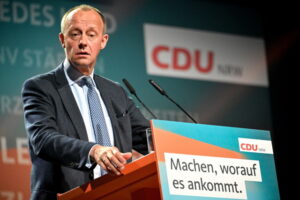For the first time since 2005, early elections will be called in Germany with Social Democrat Chancellor Olaf Scholz taking the blame entirely for the failure of the governing coalition.
After the ouster of Christian Lindner, finance minister and leader of the Free Democrats FDP, the Social Democrats were left alone with the Greens forming a minority government.
Friedrich Merz reportedly put the knife to Olaf Scholz’s throat as the CDU-CSU leader could not wait for the chancellor to set a vote in the federal parliament on whether to take a vote of confidence.
Consequently, Merz shook hands with the Social Democrats to call early elections on February 23 in order to get the country out of its political deadlock.
According to Bild, after joint discussions, the leader of the Social Democrats’ (SPD) parliamentary group, Rolf Michenich, and the head of the Christian Union (CDU and CSU) parliamentary group, Friedrich Merz, reached an agreement: elections on February 23.
February 23 February.
It should be noted that, a few days earlier, CDU General Secretary Carsten Linnemann had said on German state broadcaster ZDF’s Morgenmagazin morning magazine that new elections would probably be called on February 16 or 23.
The Free Democrats, like the Greens, are not expected to say no to the Christian Democrats-Social Democrats deal.
This practically means that the 66-year-old Scholz will ask for a vote of confidence probably before January 15. The most likely date is December 18, a week before Christmas, as Die Zeit points out.
What will happen within the day
The Bundestag’s Election Verification Committee has been in talks since this morning to prepare for the expected early elections.
The final decision on the date of the early elections will have to be approved by Germany’s federal president, Frank Walter Steinmeier, Die Welt notes.
Focus magazine, however, reckons that Scholz already has one foot out of the chancellorship as well as out of the leadership of the Social Democratic Party with current Defence Minister Boris Pistorius emerging as the Germans’ choice to succeed him in both posts. The CDU’s executive council has also scheduled a special meeting this afternoon.
Only Scholz’s party does not appear stronger in the polls after the split
Only the SPD is not benefiting from the break-up of the three-party coalition, according to a new poll conducted by the Insa institute for Bild.
All parties appear strengthened after the dissolution of the governing coalition, except for the Social Democratic chancellor’s party (SPD) and Sarah Wangencht’s left-wing coalition.
The Christian Union remains the strongest force with 32.5%, the Greens with 11.5% and the FDP with 5%.
However, the xenophobic AfD party benefits the most by climbing to 19.5% which demonstrates that it is currently the second strongest force in the federal government.
“The Alternative for Germany (AfD) party is gaining points after the break-up of the governing coalition and the election of Trump,” the head of the Insa institute, Hermann Binkert, tells Bild.
At the same time, the left-wing alliance of Sarah Wagenknecht, wife of the historic left-wing leader Oscar Lafontaine’s “BSW”, slumped to 7 percent while the Left Party (Die Linke) remained at 3.5 percent.
Olaf Scholz, however, is the big loser of the rapid political developments in the eurozone’s locomotive. In the list of the 20 most popular politicians in Germany, the Social Democrat chancellor ranks 19th.
The Christian Union (CDU/CSU) is expected to voice its objections to the existing Bundestag agenda in general. This was claimed by Alexander Hofmann, a parliamentary official of the Bavarian Christian Social Union (CSU).
“As long as a vote of confidence is not actually put forward, we will reject the Bundestag’s agenda,” Hoffmann said.
“Possible deviations could, for example, come from “a law on telephone surveillance, prenatal screening and the repayment of aid to Greece,” Focus magazine writes.
Ask me anything
Explore related questions





